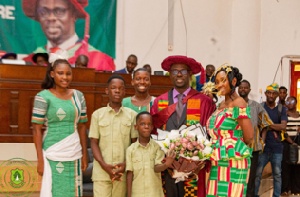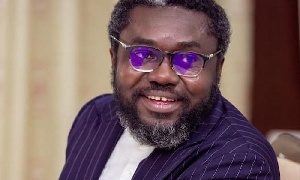Business News of Wednesday, 16 April 2025
Source: www.ghanawebbers.com
19th UDS inaugural lecture proffers solutions to animal farming in arid zones
The lecture titled "Feeding the Future: Transforming Sheep and Goat Farming" focused on improving livestock farming in Ghana's arid zones.
Prof. Ansah explained that livestock farming is vital for northern Ghana's economy. It meets over 70 percent of the country's livestock consumption demand. However, there is a significant nutritional feed gap due to seasonal fluctuations.
During the dry season, pasture biomass decreases sharply. This reduces nutrients available for livestock, affecting sheep and goat growth. The situation threatens food security in the region.
He noted that reliance on natural pastures worsens the problem. Competing land-use demands lead to conflicts between grazing lands and crop farmers.
To improve feeding systems, Prof. Ansah stressed integrating indigenous forage varieties and browse plants. Research shows species like Pennisetum purpureum and Pearl millet provide high biomass yields and essential nutrients.
These species offer better protein content, crucial for livestock health. When selecting forage, factors like yield consistency and cost-effectiveness are important.
Supplementary feeds such as groundnuts and cowpeas can help address nutritional gaps. These options boost small ruminant farming in Ghana significantly.
Prof. Ansah called for strategic investments in feed production and youth entrepreneurship. He emphasized that improving livestock nutrition can enhance productivity and contribute to food security.
In addition, he urged the government to include agricultural college students in trainee allowances. This would encourage more qualified individuals to pursue agricultural education.
The 2025 national budget included allowances for teachers and nursing trainees but excluded agricultural trainees.
The event gathered professors, university administrators, traditional rulers, clergy members, students, security representatives, and media personnel from various regions.
Vice Chancellor of UDS, Prof. Seidu Al-Hassan highlighted the importance of inaugural lectures in academia. They mark a scholar's formal induction into professorships while celebrating faculty contributions.
He reaffirmed UDS's commitment to producing quality graduates for the job market through research activities that support the national economy.











